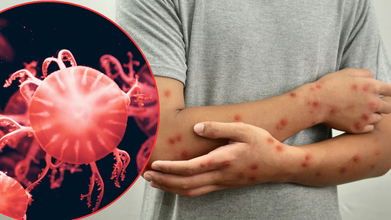- Health Conditions A-Z
- Health & Wellness
- Nutrition
- Fitness
- Health News
- Ayurveda
- Videos
- Medicine A-Z
- Parenting
- Web Stories
Baek Se-hee, South Korean Author, Dies At 35, While Saving 5 Lives

Credits: Wikimedia Commons
South Korean author Baek See-he, who courageously chronicled her struggles with mental health in the bestselling memoir I Want to Die but I Want to Eat Tteokbokki, passed away at the age of 35. Her death was announced by the Korea Organ Donation Agency, which revealed that Baek donated her heart, lungs, liver, and kidneys, ultimately saving five lives.
While the exact cause of her death was not disclosed, Baek’s writing had already offered readers a deeply personal glimpse into her battles with depression and anxiety. Her 2018 memoir captures dialogues with her psychiatrist over twelve weeks, combined with reflective essays that explore the cycles of self-abuse and the challenges of living with a persistent depressive disorder. Following the success of her first book, Baek published a sequel in 2019, I Want to Die but I Still Want to Eat Tteokbokki, which delves into the ongoing journey of striving for contentment, highlighting her openness and vulnerability.
Baek’s Battle with Dysthymia
Baek openly discussed her long-standing struggle with dysthymia, a mild but persistent form of depression. According to the National Institutes of Mental Health, dysthymia affects roughly 2 percent of adults worldwide. The condition is believed to have a combination of biological, psychological, genetic, and environmental factors, although no specific genes have yet been linked to it. Chronic stress and trauma are also known contributors.
Symptoms of dysthymia are generally milder than major depression but are long-lasting. They often include a consistently sad or anxious mood, difficulty concentrating or making decisions, low energy, hopelessness, changes in appetite or weight, disturbed sleep patterns, and low self-esteem. Treatment typically involves a combination of medication and therapy. Antidepressants can take several weeks to show full effects, and cognitive behavioral or interpersonal therapy helps patients manage distorted thoughts, improve relationships, and navigate stress.
A Legacy Through Organ Donation
Baek’s passing was marked not only by sorrow but also by the profound impact of her organ donation. According to reports cited by The Guardian and The Telegraph India, her heart, lungs, liver, and both kidneys were recovered at the National Health Insurance Service Ilsan Hospital in Gyeonggi Province, north of Seoul—the same hospital where she was born. Baek was declared brain-dead on October 16, and her decision to donate her organs has given five people a chance at life.
Born in 1990, Baek studied creative writing at university before working for five years in a publishing house. She shared her home with her rescue dog, Jaram, and underwent psychiatric treatment for dysthymia for over a decade. The idea for her memoir grew out of her blog posts sharing therapy notes, which drew significant positive feedback from readers.
Her memoir, published in Korea in 2018 and in the UK in 2022 by Bloomsbury, combines candid discussions with her psychiatrist with reflective essays, presenting a clear-eyed yet compassionate look at living with a chronic mental health condition. Her follow-up book, released in the UK last year, continued this narrative, exploring her ongoing journey toward self-acceptance and emotional resilience.
Writing That Resonated Worldwide
Baek’s memoir, named after her favourite Korean dish, tteokbokki—a spicy rice cake dish—struck a chord with readers, selling around 600,000 copies in Korea and over a million worldwide. Her work has been published in more than 25 countries, offering a rare, unflinching insight into mental health while inspiring empathy and understanding.
Is US President Donald Trump Getting A Double Hip Replacement Surgery?

Credits: Wikimedia Commons
An exclusive published on tabloid Radar, on October 16, claimed that 70-year-old US President Donald Trump is 'riddled with arthritis', and may need a double hip replacement. The story has then been widely shared, however, the sources are anonymous.
Trump's mobility has become a heated topic of debate, however, his medical memos describe him as 'in exceptional health'.
What Does White House Say About Trump's Health?
White House released a formal memoranda from the physician to the President declaring routine examinations and reassuring the public that President's health is in exceptional condition. The memo is dated from April 2025 summary released by the White House and a July 2025 follow-up memorandum. The official memos detail a comprehensive physical examination of President Trump.
However, the memo do not note for orthopedic need or surgery.
Where Is The Claim Based On?
The tabloid’s report paints a sensational picture of severe arthritis and an alleged plan for double hip replacement, citing unnamed “sources” and hinting at possible cognitive issues. The story has since been picked up by several aggregator sites, spreading widely despite the absence of verified evidence.
Importantly, the publication provides no medical records, surgeon’s statement, or official hospital documentation to substantiate its claims. In the absence of such primary proof, the report remains unverified speculation.
However, as per the physical examination by the Walter Reed National Medical Center, President had no orthopedic surgery listed in his history.
White House again released statements and a semiannual physical note in October 2025, that contained results from preventive care and imagine performed. As per the results, Trump 'remains in exceptional health'.
The official documents specifically mention diagnoses like chronic venous insufficiency, a common cause of leg swelling in older adults, but make no reference to any scheduled hip surgery or confirmed cases of bilateral hip failure. While this doesn’t rule out a potential orthopedic concern, it does indicate that there is no primary, verifiable evidence from the White House or Walter Reed suggesting any planned surgical procedure.
What Is A Double Hip Replacement?
As per NIH researchers, a double hip replacement, also known as a bilateral hip replacement, is a surgical procedure where both hip joints are replaced in a single operation. This is performed when both hips are severely damaged, often due to conditions like osteoarthritis or rheumatoid arthritis. The procedure can be done simultaneously (one surgery) or in stages (separate surgeries), but the simultaneous approach is often preferred as it typically has a shorter overall recovery time and lower risk of systemic complications like blood clots compared to two separate surgeries.
A Severe Mpox Strain Is Spreading in the US, Here’s What You Need to Know to Stay Safe

Credits: Canva
Health officials in the United States have raised alarms after confirming cases of a more severe mpox strain, known as Clade I, in California. This marks the first reported instance of this strain spreading locally, as previous US cases had all been linked to international travel.
So far, three cases have been confirmed across Southern California, including Los Angeles County and Long Beach. All patients required hospitalization but are now recovering at home. The discovery has triggered concern among health experts as Clade I mpox is known to cause more serious illness than the milder Clade II strain that led to the 2022 global outbreak.
What Is Clade I Mpox?
Mpox (formerly called monkeypox) is caused by a virus from the same family as smallpox. There are two main genetic variants or clades that infect humans, Clade I and Clade II.
While Clade II was responsible for the global outbreak in 2022–23, Clade I has historically circulated in parts of central and western Africa. It is associated with more severe disease, higher rates of complications, and in some cases, fatalities, particularly among children, pregnant women, and people with weakened immune systems.
Experts are now investigating how this strain might have started circulating within US borders and whether community transmission is occurring.
Early Signs and Symptoms to Watch For
Mpox usually begins with flu-like symptoms and can be easily mistaken for a seasonal illness in its early stages. Common early signs include:
- Fever, chills, or sweating
- Headache and muscle aches
- Fatigue or weakness
- Swollen lymph nodes
- Sore throat or nasal congestion
Within a few days, a distinctive rash develops, starting as red spots that progress into fluid-filled blisters or pustules. These can appear on the face, palms, soles, genitals, or even inside the mouth and eyes. The rash typically scabs over and heals within two to four weeks.
In more severe Clade I infections, complications may include secondary bacterial infections, prolonged healing, scarring, eye involvement leading to blindness, or inflammation of internal organs. In rare cases, systemic infection can occur, posing life-threatening risks.
Who Is Most at Risk?
Certain groups are more likely to contract or develop severe mpox:
- Those in close, intimate, or prolonged contact with an infected person
- Individuals who share contaminated clothing, bedding, or surfaces
- People exposed to respiratory droplets through face-to-face interaction
- Individuals with multiple sexual partners or exposure in commercial sexual venues
- People with compromised immunity, such as those living with HIV, cancer, or transplant recipients
Children and pregnant women
Public health experts emphasize that awareness of symptoms and early diagnosis are key to preventing further spread.
How to Stay Safe
While most mpox cases are not fatal, Clade I poses a higher risk, making prevention critical. Health agencies recommend the following:
- Avoid direct contact with people who have rashes or lesions resembling mpox.
- Do not share personal items like towels, bedding, or clothing.
- Practice good hand hygiene, wash hands often with soap and water or use an alcohol-based sanitizer.
- Use masks in crowded or high-risk settings where close contact occurs.
- Seek medical attention immediately if you notice suspicious rashes or flu-like symptoms after possible exposure.
Experts also stress that vaccines used during the 2022 outbreak, such as Jynneos, remain effective against both Clade I and Clade II strains. Vaccination, combined with early treatment and isolation of confirmed cases, is expected to play a crucial role in containing the spread.
First Locally Acquired Clade 1 Mpox Case Detected California, Symptoms You Should Look Out For

(Credit-Canva)
The Long Beach Department of Health and Human Services has confirmed its first case of locally acquired Clade-1 Monkeypox strain. In a recent press release, the authorities informed the citizens that the person who was diagnosed had no recent travel history, which means the virus was contracted locally.
While the risk for the public remains low, the health department warns people to stay safe. Since it is a contagious disease, the health investigation is still ongoing, as the public officers comb through the person’s history. However, currently there are no other cases of the clade 1 mpox. Mayor Rex Richardson said, “While the overall risk of mpox clade I exposure to the public remains low, we are taking this very seriously and ensuring our community and health care partners remain vigilant so we can prevent any more cases.”
What Is Mpox?
According to the World Health Organization, Mpox (previously called monkeypox) is a sickness caused by a virus. Think of it as being like different types of flu—there are a few versions of the mpox virus, called clades.
The global outbreak that happened in 2022–2023 was caused by one of these versions, specifically Clade IIb. The virus spreads through close contact with an infected person's sores or body fluids, with contaminated items like bedding, or with infected animals. The virus can also be passed from a pregnant person to their baby.
Most mpox treatment involves supportive care—doctors help manage symptoms like pain and fever while the body recovers. This includes keeping the patient well-nourished and hydrated, caring for the rash, and addressing any secondary infections. Fortunately, vaccines are available for mpox.
How is Clade 1 Different From Clade 2?
This new case involves Clade 1 mpox, which is historically associated with more severe illness and is typically found in Central and East Africa.
In contrast, the large 2022-2023 outbreak in the U.S. and globally was caused by Clade 2, which usually results in milder illness. Mpox, regardless of the clade, spreads through direct contact with sores, body fluids, intimate contact, or contaminated items. Symptoms can include a rash or sores, fever, chills, sore throat, swollen lymph nodes, and body aches.
What Are The Health Risks of Mpox?
Long Beach health officials are currently investigating the patient's source of exposure and conducting contact tracing, though no other cases have been identified so far.
Long Beach Mayor Rex Richardson emphasized that while the overall risk to the public remains low, the city is taking the situation seriously. He stressed the importance of continued surveillance, early response, and vaccination.
A Long Beach public health physician, Dr. Cliff Okada, advised: "Anyone with an unexplained rash or lesions should seek care promptly. Speak openly with intimate partners and your healthcare provider. Early action protects you and others."
Who Is At Risk For Mpox Clade 1?
The Centers for Disease Control and Prevention (CDC) continues to recommend the Jynneos vaccine for people at high risk of exposure. This includes gay, bisexual, and other men who are intimately involved with other men, transgender and non-binary people, those with weakened immune systems (such as people with HIV), individuals exposed to an infected person, those with occupational exposure, and people traveling to areas with ongoing outbreaks.
Most mpox patients recover on their own within 2 to 4 weeks. A booster shot is not currently recommended for those who have completed the two-dose vaccine series.
© 2024 Bennett, Coleman & Company Limited

